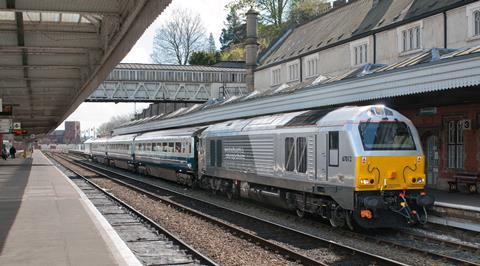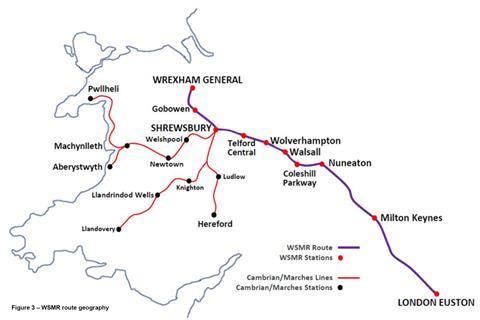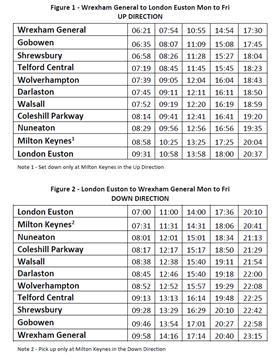UK: Plans have been drawn up to revive open access services between London, Shrewsbury and Wrexham under the WSMR brand, 13 years after a previous initiative ended. Tony Miles reports.

Wrexham, Shropshire & Midlands Railway Company Ltd has begun the pan-industry consultation process with a view to reintroducing open access services between Wrexham and London. The proposal envisages a service of five trains per day in each direction Monday to Saturday with four in each direction in Sundays.
Unlike the previous Wrexham & Shropshire operation, which ran in 2008-11 and used a complex route through the West Midlands and over the Chiltern Main Line to serve London Marylebone, the latest plan calls for a service running from London Euston via Nuneaton, Coleshill Parkway and Wolverhampton.
WSMR intends to use the currently freight-only line through Sutton Park. Its services would call at Gobowen, Shrewsbury, Telford Central, Wolverhampton, Darlaston, Walsall, Coleshill Parkway, Nuneaton and Milton Keynes on its journey between Wrexham General and London Euston.
Project promoter WSMR is backed by Birmingham-based consultancy SLC Rail and has no link to the previous open access operator. SLC Rail told Rail Business UK that it hoped to lodge a formal application for paths with the Office of Rail & Road in early 2024.
Its consultation document calls for an initial seven year Track Access Agreement. It says that as well as connecting the Shropshire area with London, it will deliver ‘direct connectivity where it is either currently inadequate or does not exist’, citing Walsall – London and intra-Midlands links including Walsall – Nuneaton as examples.
Rolling stock

The proposal is predicated on using Class 22x diesel trainsets to operate the service. It refers to East Midlands Railway’s Class 222 fleet which will become available from next year as Class 810 Aurora bi-mode trains are introduced on Midland Main Line inter-city services.
WSMR suggests that it would significantly modify the Class 22x trainsets, fitting ‘intelligent engine start/stop technology and the installation of modified engines which meet Euro IIIb emissions standards’. If successful, WSMR says these modified engines would deliver a 70% reduction in NOx and an 80% reduction in particulate emissions.
The application says that WSMR will develop a business case to assess the viability of fitting the Class 22x fleet with battery traction technology ‘for short distances’. This is part of an ‘aspiration’ to introduce hybrid traction, either on the initial fleet once it has bedded in, or via a future procurement.
Scramble for paths

WSMR says its timetable ‘has been developed and validated based on the December 2023 timetable using industry recognised timetable develop and validation tool ATTune to demonstrate its credibility’.
The project promoter adds that it is aware of various requests for paths on the affected routes already being assessed by ORR, including long-planned extra London Euston – Liverpool services to create a 30 min interval service all day. These were a feature of incumbent WCML operator Avanti West Coast’s pre-Covid franchise.
WSMR’s submission acknowledges ‘uncertainty’ around access to the WCML and connecting routes. Potential competing interests include Grand Union’s request to launch a Stirling – London Euston open access service, as well as the proposed Transport for Wales recast of services between Wrexham, Shrewsbury, Birmingham International and Cardiff. Other external risks include the future scope of High Speed 2 work at London Euston, and further analysis by the Department for Transport of optimal use of the national rail network.
Saving money
WSMR also believes its plans could offer ‘potential cost savings’ to DfT if these ‘enable re-deployment of train, staff, and route-knowledge resources away from the single contracted Avanti West Coast train per day on each of the Wrexham – Chester – London Euston and Shrewsbury – Wolverhampton -London Euston routes’.
The project promoter says that revenue analysis has already been sent to ORR showing that its proposition meets the regulator’s benchmark Not Primarily Abstractive criteria. WSMR also suggests that its services should not present significant performance risks, noting that ‘on the section between Wolverhampton and Wrexham General, the timetable is largely similar in quantum to that which was in place when Wrexham Shropshire & Marylebone Railway operated between 2008 and 2011 with an excellent performance record’.
Customer proposition
A ‘simple and competitive’ fare structure would be offered, augmented by a loyalty scheme. WSMR would offer ‘hot and cold food and beverages sourced sustainably and locally from business along the route’, making use of the galley/kitchen area already available in the first class driving car on Class 22x trainsets. Passengers would be able to order food before departure via an app.
Seating would be ‘comparatively more generous, offering additional tables and improved leg room’ than existing inter-city rolling stock. ‘WSMR trains will always be accessible to our less abled and older generation customers’, the company insists.



